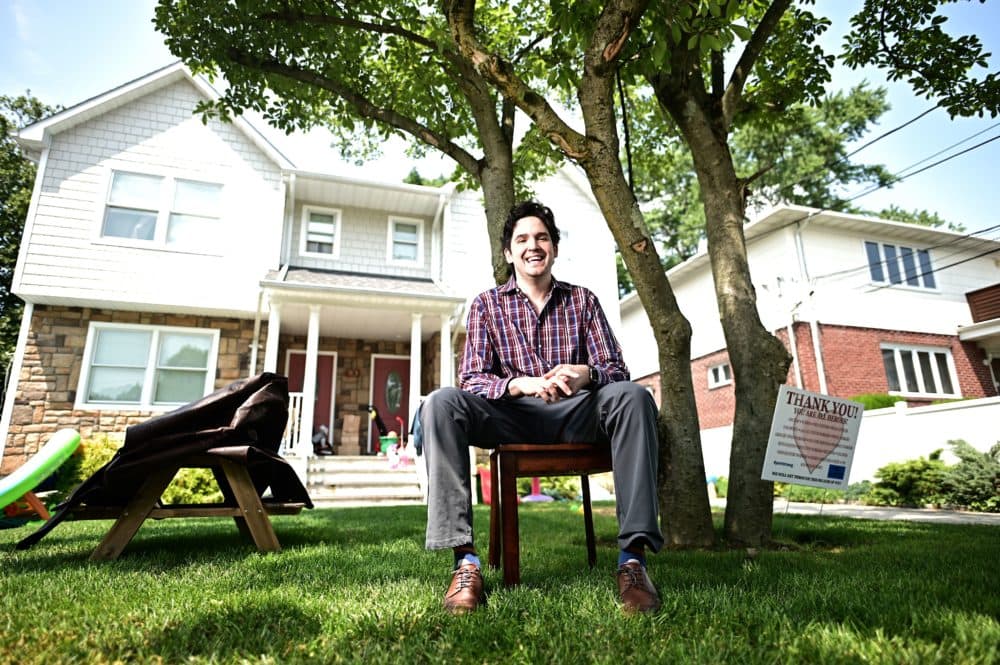Advertisement
For This COVID-19 Long-Hauler, Talking, Breathing And Swallowing Are Still A Challenge

Perhaps the most confounding aspect of COVID-19 is the disease’s unpredictability.
The coronavirus affects every system of the body, including the respiratory and neurological systems and even the blood. Some patients need ventilators to breathe or have flu-like symptoms for a week or two, while others show no symptoms but shed the virus and unknowingly infect others.
And then there are the long-haulers. They gather by the thousands in online support groups as month after month goes by with little to no signs of getting better.
These patients are a mix of younger and older people whose coughing, chest tightness, shortness of breath and fatigue can last well after they test positive for the coronavirus, according to Dr. Christopher Babiuch of the Cleveland Clinic.
Among them is Dr. Scott Krakower, a 40-year-old psychiatrist from New York who had chills and fever for nearly two weeks in April before testing positive. He closed himself off in a room at home to protect his wife and two young children, but was eventually hospitalized.
His life was essentially saved by Dr. Robert Glatter at New York’s Lenox Hill Hospital who gave Krakower life-saving steroids that opened his throat. But four months later, he says he’s still feeling winded on short walks and has trouble swallowing and talking.
“I try to think, 'OK, I'm ready to go back to work and things like that,' ” Krakower says. “And then my friends and my colleagues who are in the medical field, I think just listening to me try to talk to explain why I should even do something, I think that they were like, 'Scott, come on. You can't even basically hold a conversation still at times.' ”
Krakower says he was quarantined at home for five weeks before going to the hospital. His symptoms started with what he describes as the worst chills of his life, followed by losing his sense of taste and smell about a week later.
Losing those senses was a “very unusual and bizarre feeling” that Krakower says he will never forget.
Advertisement
“All of a sudden, you're eating and you're trying to figure out what the food tastes like, and then you can't decide,” he says. “And then you realize it doesn't have a taste, so then you eat more ... to see if you could somehow find a flavor to it. But you could still taste like the sweet or the salty, and then after a while of whatever was remaining, just sort of dropped off.”
From there, Krakower says his condition rapidly deteriorated. He developed a violent cough that wouldn’t stop. Eventually, he started coughing up blood.
“It was just horrific,” he says. “Every night at like six o'clock, I would just dread it, dread it because I would be coughing throughout the day and then the night would come, and then it was almost like a very loud barking cough, finally coughing up blood.”
Krakower says the strangest thing about his illness was that he would seemingly start to recover, and then his symptoms would come roaring back worse than before.
“I would feel better for a period of like three or four days, almost to the point like I felt like the illness was gone, and then I rapidly deteriorated again,” he says. “And then out of nowhere, the whole thing spiraled down even more violent than the first time around. It was literally like my throat would start to swell and then I couldn't talk.”
His doctors said he was having a cytokine storm to his throat. It got so bad that he couldn’t swallow and started to choke on his food. When he lost 15 pounds, that’s when his family decided it was time to take him to the hospital.
“I think [with] any other illness, you would think that you could walk out the door and go to the E.R. and get treatment, maybe get hospitalized,” Krakower says. “And this illness, you have to think, 'OK well, what if you do this? What if you infect? What if I walk through and I sneeze the wrong way and then my kids got it?’ ”
Dr. Glatter put him on IV steroids, which helped decrease the swelling in his throat, he says. When he was finally discharged from the hospital, he says he felt better for a week before feeling sick again.
“I wound up on high dose oral steroids, coughing around the clock again, and there was a fear I was going to go back into the hospital,” he says. “My oxygen was starting to drop again, and then I just stayed like that. I was so sick for like a good three or four weeks, even after hospital.”
Krakower says just talking about his experience is difficult now. He suspects that the virus impacted his nervous system, but he says he tries not to think about that.
“When I lost my sense of taste and smell, I didn't realize that my other senses were also dulled until after it came back,” he says. “So I find it hard to believe that it didn't impact the nervous system to some extent. It was almost like an awakening feeling when it came back.”
Karyn Miller-Medzon produced and edited this interview for broadcast with Tinku Ray. Samantha Raphelson adapted it for the web.
This segment aired on July 21, 2020.

